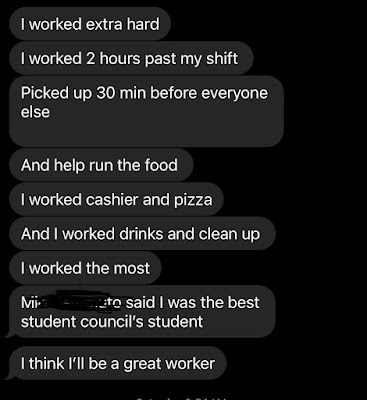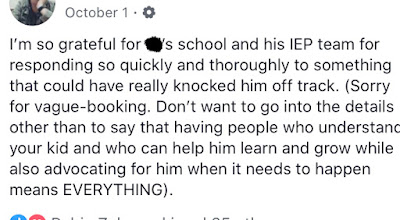I have never raised a neurotypical child**, and I suspect parents of children who are not neuro-spicy have taken a very different path on the journey of parenting. Normally, I don't think about this, but it is end of the school year which means school art fairs and concerts, etc. In settings like this with many other parents and same-age peers around, I begin to suspect there might be some dissimilarities between what happens at our house and what happens in other homes.***
But, I don't know that for sure, so I created this list (off the top of my head) to see if my suspicions are true. I present to you Moe's questions for parents of neurotypical kids, the tween-teen version:
1) Do your children wear fleeces and hoodies well into the summer, even when it is above 80 degrees?
2) How many times do you address a child, who is in the same room, before receiving a response?
3) How much do you know about Star Wars (the films and the various Lego sets that have come out since the early 2000s)? Fall Out (the game and the TV series)? Tanks? Dragons? Paint colors?
4) If a city has a subway or a train, are you obligated to ride it even if you don't have anywhere to go?
5) When you call your house, does your child answer and insist that you carry out a long, make-believe conversation either about what you want on your pizza ("Thanks for calling Pizza Hut. Can I take your order?") or what your emergency is ("911. What's your emergency?") Or, do they pick up the phone and sit in silence for a minute before saying, "Yeah?"
6) Do they start a conversation with you before they even get into the room and despite the fact you are in the middle of talking to someone else? Do they start talking about something they made up without realizing that you don't understand because you can't see into their head?
7) If they call or FaceTime you, do they start with hello or ask you how you are doing or do they just jump into to telling you why they are stressed or what they need from you?
8) Do you sometimes need to draw pictures to make sure everyone knows what you are talking about? Do you have to explain idioms? Or sometimes find yourself trying not to laugh when someone takes something so literally that it's absurd?
9) When you go to school concerts or other performances, do you have a stress response caused by memories of past concerts when your kid sang too loud or froze or refused to wear appropriate clothing?
10) Do you have a nagging sense of fear every time you drop them off at a party or any other informal gathering of their peers? Do they ever text you from a closet or from under a table because they are overwhelmed and want to be picked up ASAP?
11) What about school? Do you worry about them when they are there? How often do you get calls and emails from school? Weekly? Monthly? Never?
12) Do they come to you and ask for a squeeze or some other help so they can re-regulate?
13) How much time do you spend explaining to your children how to read non-verbal cues or to be able to understand why something they did upset someone?
14) How many times have their classmates or friends come to you to complain about what your child is doing? How many times have people glared at you or chided you for your failure to properly discipline your child?
15) Do they refuse to eat things because the texture isn't right? Do they refuse to wear certain clothing because it's too itchy, too tight, or too something else? Do they avoid showers because they don't like how the water on their body feels during the seconds between getting out of the shower and drying off with a towel?
16) Do they refuse to go to certain areas of a store because the humming noise that you can't even hear is too loud for them to bear?
17) Do they avoid going into certain rooms in the house because they saw a bug there once?
18) Do they get overwhelmed and shut down when you are in the middle of a conversation?
19) Do they get so absorbed into doing something that they won't come to dinner?
20) Do they provide unwanted details about the workings of their digestive system WHILE they are still in the bathroom? Do they sometimes send pictures?
Twenty is a good stopping point even though I think I could probably go on forever! I suspect I know the answer to some of these questions, but I'd really like to hear from you all (parents of neurotypical AND neuro-spicy kids).
Writing these reminded me just how rich and interesting our lives are. I honestly wouldn't change a thing about my kids. What I would change is the world that isn't terribly welcoming of them. I wish for teachers, peers, family members, and strangers who don't judge my kids or mistreat them. Can you imagine a world where all kids are embraced for who they are and encouraged to grow in the ways that make the most sense to them? I hope we can get there some day. In the meantime, let's support each other by telling our stories!
 |
| Here is a picture of a cup of coffee, just because. |
**I'm not including Big Sissy here because I didn't have the opportunity to parent her until she was already as tween.
***Before I go any further, I want to state unequivocally that this is not a post about how I don't like autism and, therefore, my autistic children. Ditto ADHD. I feel like this should be obvious, but I have encountered comments in the past telling me that I don't accept my children for who they are. I do. And, I am also sure there are some real challenges in my kids' lives that they want people to know about and acknowledge. I don't post without consulting them.



























